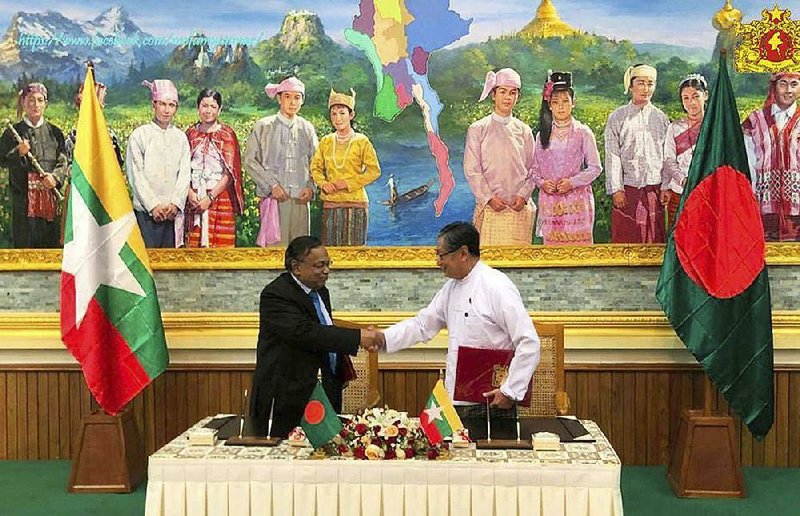BANGKOK -- Burma has agreed to take back Muslim Rohingya refugees who fled to neighboring Bangladesh to escape violence in Burma's Rakhine state.
Burma announced the agreement but provided no details on how many Rohingya refugees would be allowed to return home. Bangladesh said the repatriations are to begin within two months.
More than 620,000 Rohingya have fled from Burma into Bangladesh since Aug. 25, when the army began what it called "clearance operations" after an attack on police posts by a group of Rohingya insurgents. Refugees arriving in Bangladesh said their homes were set on fire by soldiers and Buddhist mobs, and some reported being shot at by security forces.
"The first step of the repatriation process has been done," said Foreign Minister Abul Hassan Mahmood Ali of Bangladesh.
Ali, who in September accused Burma's military of killing thousands of Rohingya, said he would not divulge the terms and conditions of any accord until Saturday. But he put the onus of responsibility on Burma.
The office of Burmese civilian leader Aung San Suu Kyi said the agreement "on the return of displaced persons from Rakhine state" was signed by Cabinet officials in Naypyitaw, Burma's capital. It said the pact follows a formula set in a 1992 repatriation agreement signed by Burma and Bangladesh after an earlier spasm of violence. Under that agreement, Rohingya were required to present residency documents, which few have, before being allowed to return to Burma.
Burma is often called Myanmar, a name that military authorities adopted in 1989. Some nations, such as the United States and Britain, have refused to adopt the name change.
"We're continuing our bilateral talks with Myanmar so that [Rohingya] could return to their country," Bangladesh Prime Minister Sheikh Hasina was quoted as saying by the United News of Bangladesh news agency. "It's my call to Myanmar to start taking back soon their nationals from Bangladesh."
Rohingya at a refugee camp in Bangladesh expressed deep doubts about the agreement.
"They burned our houses, they took our land and cows -- will they give us these things back?" asked Abdul Hamid from Hoyakong.
"I'm not happy at all. First, I need to know if they are going to accept us with the Rohingya identity," said Sayed Alom, also from Hoyakong.
"I will never go back home," said Mohamed Rafique, a Muslim cleric who arrived at a refugee camp in Bangladesh in September. "How can I go back to a place where they want to kill me?"
Rohingya Muslims have faced state-supported discrimination in predominantly Buddhist Burma for decades. Though members of the ethnic minority first arrived generations ago, Rohingya were stripped of their citizenship in 1982, denying them almost all rights and rendering them stateless. They cannot travel freely, practice their religion, or work as teachers or doctors, and they have little access to medical care, food or education.
The Burmese government has refused to accept them as a minority group, and the statement issued Thursday by Suu Kyi's office did not use the term "Rohingya."
The United States on Wednesday declared the violence against Rohingya to be "ethnic cleansing," and threatened penalties for Burmese military officers involved in the crackdown.
"After a careful and thorough analysis of available facts, it is clear that the situation in northern Rakhine state constitutes ethnic cleansing against the Rohingya," U.S. Secretary of State Rex Tillerson said in a statement Wednesday. He said the U.S. would work through the United Nations and "pursue accountability through U.S. law, including possible targeted sanctions."
The human-rights group Amnesty International said in a report Tuesday that the discrimination against Rohingya has worsened considerably in the past five years and amounts to "dehumanizing apartheid."
"There can be no safe or dignified returns of Rohingya to Myanmar while a system of apartheid remains in the country, and thousands are held there in conditions that amount to concentration camps. Returns in the current climate are simply unthinkable," the group's director for refugee and migrant rights, Charmain Mohamed, said in a statement Thursday.
Burmese authorities have in recent weeks balked at the possibility of the Rohingya returning to their native villages. Instead, Burma's government has spoken obliquely of camps where they might be sequestered.
Around 120,000 Rohingya already live in such camps in the central part of Rakhine after a wave of violence in 2012 forced them from their homes.
In late October, officials in Burma ordered the harvesting of fields that had been deserted in the Rohingya exodus. Authorities in Burma have said they will confiscate all land that they consider "abandoned."
Other serious obstacles remain to any repatriation. For one, it's not clear whether Burma's military would accept a proof of their residence if returning Rohingya were even able to offer it. Many fled without any papers. Others never had any.
Bangladesh, itself poor and overcrowded, is struggling to cope with the influx, which has created on the country's eastern flank one of the world's largest refugee camps.
Human-rights groups worry that this sprawling settlement could be a breeding ground for disease and religious radicalism.
Meanwhile, Senior Gen. Min Aung Hlaing, commander in chief of Burma's military, said in a statement last week that "it is impossible to accept the number of persons proposed by Bangladesh."
He also raised doubts about any repatriation process, saying it had to be "acceptable" to ethnic Rakhine Buddhists who have been accused of aiding in pogroms against the Rohingya.
"Emphasis must be placed on the wishes of local Rakhine ethnic people who are real Myanmar citizens," said an English statement on the military commander's Facebook page before warning that any "unacceptable situation" could lead to "political instability."
Information for this article was contributed by Arun Devnath and Kyaw Thu of Bloomberg News; by Hannah Beech of The New York Times; and by staff members of The Associated Press.
A Section on 11/24/2017
